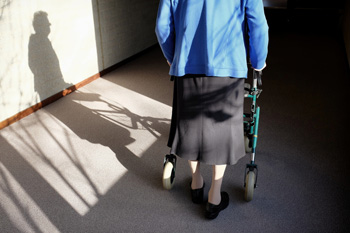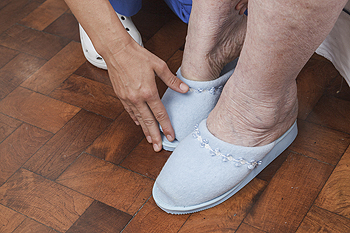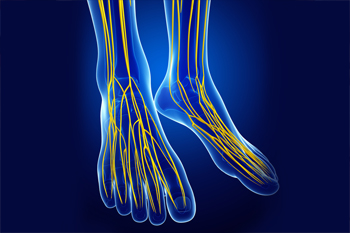February 2021
Important Keys for Senior Foot Care
 As the feet get older, they can become worn down from years of supporting the body. The skin becomes less elastic, which can lead to issues such as blisters and cracked heels. Because of the complexity of issues that can arise, wearing the right footwear is one of the most important factors in caring for your feet. Shoes should have a proper grip and gently hug the feet. Keeping the feet clean, warm, and dry is important as well in order to prevent an infection. The toenails should be cut short and straight across in order to prevent ingrown toenails. Any issues with the feet should be checked by a podiatrist in order to prevent them from getting worse. This includes any sores or other abnormalities. A podiatrist will also be able to provide other recommendations on how to care for your feet.
As the feet get older, they can become worn down from years of supporting the body. The skin becomes less elastic, which can lead to issues such as blisters and cracked heels. Because of the complexity of issues that can arise, wearing the right footwear is one of the most important factors in caring for your feet. Shoes should have a proper grip and gently hug the feet. Keeping the feet clean, warm, and dry is important as well in order to prevent an infection. The toenails should be cut short and straight across in order to prevent ingrown toenails. Any issues with the feet should be checked by a podiatrist in order to prevent them from getting worse. This includes any sores or other abnormalities. A podiatrist will also be able to provide other recommendations on how to care for your feet.
Proper foot care is something many older adults forget to consider. If you have any concerns about your feet and ankles, contact Dr. Eugenio Rivera from Calo Foot & Ankle Specialists. Our doctor can provide the care you need to keep you pain-free and on your feet.
The Elderly and Their Feet
As we age we start to notice many changes in our body, but the elder population may not notice them right away. Medical conditions may prevent the elderly to take notice of their foot health right away. Poor vision is a lead contributor to not taking action for the elderly.
Common Conditions
- Neuropathy – can reduce feeling in the feet and can hide many life-threatening medical conditions.
- Reduced flexibility – prevents the ability of proper toenail trimming, and foot cleaning. If left untreated, it may lead to further medical issues.
- Foot sores – amongst the older population can be serious before they are discovered. Some of the problematic conditions they may face are:
- Gouging toenails affecting nearby toe
- Shoes that don’t fit properly
- Pressure sores
- Loss of circulation in legs & feet
- Edema & swelling of feet and ankles
Susceptible Infections
Diabetes and poor circulation can cause general loss of sensitivity over the years, turning a simple cut into a serious issue.
If you have any questions please feel free to contact our office located in Bellaire, TX . We offer the newest diagnostic and treatment technologies for all your foot and ankle needs.
Techniques That May Help to Prevent Falling
 Falling episodes among elderly people is a common occurrence worldwide. Many patients' feet are affected, and may endure a broken foot or sprained ankle as a result of an unexpected fall. Effective prevention techniques can consist of improving lighting in the household and getting regular physical examinations. Maintaining correct medications which may affect your vision can also reduce the risk of falling. Additionally, many patients find it is beneficial to install grab bars in the shower and toilet area, as this provides the necessary stability that can help to prevent falling. If you or a loved one is concerned about how falling can affect the feet, it is suggested that you speak with a podiatrist who can help you with proper prevention techniques.
Falling episodes among elderly people is a common occurrence worldwide. Many patients' feet are affected, and may endure a broken foot or sprained ankle as a result of an unexpected fall. Effective prevention techniques can consist of improving lighting in the household and getting regular physical examinations. Maintaining correct medications which may affect your vision can also reduce the risk of falling. Additionally, many patients find it is beneficial to install grab bars in the shower and toilet area, as this provides the necessary stability that can help to prevent falling. If you or a loved one is concerned about how falling can affect the feet, it is suggested that you speak with a podiatrist who can help you with proper prevention techniques.
Preventing falls among the elderly is very important. If you are older and have fallen or fear that you are prone to falling, consult with Dr. Eugenio Rivera from Calo Foot & Ankle Specialists. Our doctor will assess your condition and provide you with quality advice and care.
Every 11 seconds, an elderly American is being treated in an emergency room for a fall related injury. Falls are the leading cause of head and hip injuries for those 65 and older. Due to decreases in strength, balance, senses, and lack of awareness, elderly persons are very susceptible to falling. Thankfully, there are a number of things older persons can do to prevent falls.
How to Prevent Falls
Some effective methods that older persons can do to prevent falls include:
- Enrolling in strength and balance exercise program to increase balance and strength
- Periodically having your sight and hearing checked
- Discuss any medications you have with a doctor to see if it increases the risk of falling
- Clearing the house of falling hazards and installing devices like grab bars and railings
- Utilizing a walker or cane
- Wearing shoes that provide good support and cushioning
- Talking to family members about falling and increasing awareness
Falling can be a traumatic and embarrassing experience for elderly persons; this can make them less willing to leave the house, and less willing to talk to someone about their fears of falling. Doing such things, however, will increase the likelihood of tripping or losing one’s balance. Knowing the causes of falling and how to prevent them is the best way to mitigate the risk of serious injury.
If you have any questions, please feel free to contact our office located in Bellaire, TX . We offer the newest diagnostic and treatment technologies for all your foot care needs.
Hammertoe Is a Common Deformity
 A hammertoe is one of the most common toe deformities in which one or more of the little toes bends abnormally at the middle joint, giving the toe a hammer-like appearance. It can be caused by wearing poorly fitted shoes, nerve damage to the foot, rheumatoid arthritis, and trauma to the toes. The symptoms of hammertoe often include difficulty moving the affected toe, pain, and the formation of corns and calluses on top of the affected toe as it rubs repeatedly against your shoes. There are a variety of both conservative and surgical treatments that your podiatrist may recommend depending on the severity of your hammertoe. To learn more about this condition, please consult with a podiatrist.
A hammertoe is one of the most common toe deformities in which one or more of the little toes bends abnormally at the middle joint, giving the toe a hammer-like appearance. It can be caused by wearing poorly fitted shoes, nerve damage to the foot, rheumatoid arthritis, and trauma to the toes. The symptoms of hammertoe often include difficulty moving the affected toe, pain, and the formation of corns and calluses on top of the affected toe as it rubs repeatedly against your shoes. There are a variety of both conservative and surgical treatments that your podiatrist may recommend depending on the severity of your hammertoe. To learn more about this condition, please consult with a podiatrist.
Hammertoe
Hammertoes can be a painful condition to live with. For more information, contact Dr. Eugenio Rivera from Calo Foot & Ankle Specialists. Our doctor will answer any of your foot- and ankle-related questions.
Hammertoe is a foot deformity that affects the joints of the second, third, fourth, or fifth toes of your feet. It is a painful foot condition in which these toes curl and arch up, which can often lead to pain when wearing footwear.
Symptoms
- Pain in the affected toes
- Development of corns or calluses due to friction
- Inflammation
- Redness
- Contracture of the toes
Causes
Genetics – People who are genetically predisposed to hammertoe are often more susceptible
Arthritis – Because arthritis affects the joints in your toes, further deformities stemming from arthritis can occur
Trauma – Direct trauma to the toes could potentially lead to hammertoe
Ill-fitting shoes – Undue pressure on the front of the toes from ill-fitting shoes can potentially lead to the development of hammertoe
Treatment
Orthotics – Custom made inserts can be used to help relieve pressure placed on the toes and therefore relieve some of the pain associated with it
Medications – Oral medications such as anti-inflammatories or NSAIDs could be used to treat the pain and inflammation hammertoes causes. Injections of corticosteroids are also sometimes used
Surgery – In more severe cases where the hammertoes have become more rigid, foot surgery is a potential option
If you have any questions please contact our office located in Bellaire, TX . We offer the newest diagnostic and treatment technologies for all your foot and ankle needs.
Causes of Nerve Pain in the Foot
Do your feet feel like they are burning, tingling, or feel like they're getting an electric shock? These symptoms are indicative of nerve pain. This type of pain in the feet can be concerning and has a variety of causes. Baxter’s neuropathy is a condition in which the nerve located just under the base of the foot’s arch is compressed. This can cause nerve pain and may be more common in individuals who have other foot problems, such as plantar fasciitis, flat feet, bone spurs, and those who are obese. Morton’s neuroma refers to a compression of the nerves between the toes, caused by thickened tissues. Tarsal tunnel syndrome is caused by the compression of the posterior tibial nerve and can result in nerve pain in both the foot and the ankle. Both peripheral and diabetic neuropathy are serious conditions that are the result of nerve damage in the lower limbs. To find out what is causing the nerve pain in your feet, it is suggested that you consult with a podiatrist.
Foot Pain
Foot pain can be extremely painful and debilitating. If you have a foot pain, consult with Dr. Eugenio Rivera from Calo Foot & Ankle Specialists. Our doctor will assess your condition and provide you with quality foot and ankle treatment.
Causes
Foot pain is a very broad condition that could be caused by one or more ailments. The most common include:
- Bunions
- Hammertoes
- Plantar Fasciitis
- Bone Spurs
- Corns
- Tarsal Tunnel Syndrome
- Ingrown Toenails
- Arthritis (such as Gout, Rheumatoid, and Osteoarthritis)
- Flat Feet
- Injury (from stress fractures, broken toe, foot, ankle, Achilles tendon ruptures, and sprains)
- And more
Diagnosis
To figure out the cause of foot pain, podiatrists utilize several different methods. This can range from simple visual inspections and sensation tests to X-rays and MRI scans. Prior medical history, family medical history, and any recent physical traumatic events will all be taken into consideration for a proper diagnosis.
Treatment
Treatment depends upon the cause of the foot pain. Whether it is resting, staying off the foot, or having surgery; podiatrists have a number of treatment options available for foot pain.
If you have any questions, please feel free to contact our office located in Bellaire, TX . We offer the newest diagnostic and treatment technologies for all your foot care needs.










